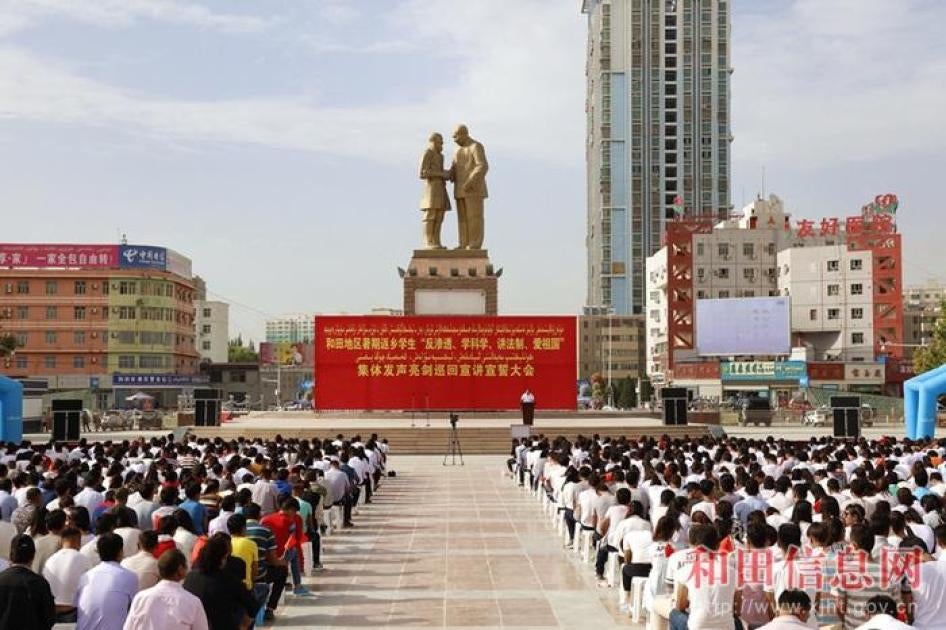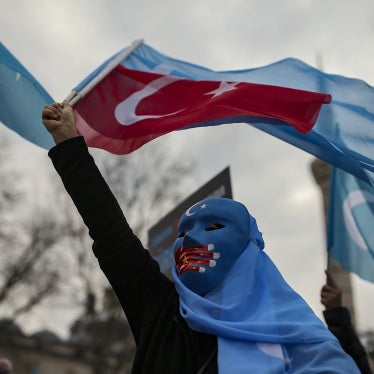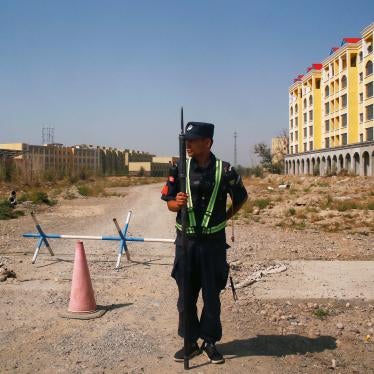(New York) – The Chinese government’s revised regulations in the Xinjiang region tighten controls over the religious practices of the predominantly Muslim ethnic Uyghurs, Human Rights Watch said today.
The revisions, effective February 1, 2024, focus on “Sinicizing” religions, a government priority under President Xi Jinping since 2016 to make places of worship and religious teachings better reflect Han Chinese culture and Chinese Communist Party ideology. Many of the 2024 revisions appear to bring Xinjiang’s regulatory framework in line with restrictions in national laws and regulations adopted since 2014.
“The Chinese government’s new regulations on religion in Xinjiang is the latest attempt to suppress Uyghur culture and ideology,” said Maya Wang, acting China director at Human Rights Watch. “The revisions aim to forcibly transform religious practice to be consistent with Chinese Communist Party ideology: to do otherwise risks imprisonment.”
Chinese authorities last amended these religious regulations in 2014, replacing regulations promulgated two decades earlier. The regulations and their revisions reflect the Chinese government’s changing priorities in Xinjiang, where Uyghurs have been subjected to heavy-handed repression.
Under the 2024 regulations, religions must “practice the core values of socialism” and “adhere to the direction of Sinicization of religions” (article 5). Whether places of worship are being “built, renovated, expanded, or rebuilt,” they should “reflect Chinese characteristics and style in terms of architecture, sculptures, paintings, decorations, etc.” (article 26). The revisions also impose new requirements before religious institutions can apply to create places of worship (article 20), as well as more stringent restrictions and cumbersome approval processes for building, expanding, altering and moving places of worship (articles 22 and 25).
The “Sinicization” of religions, however, goes beyond controlling the appearance, number, location and size of religious venues, Human Rights Watch said. Places of worship must also “deeply excavate the content of [religious] teachings and canons that are conducive to social harmony … and interpret them in line with the requirements of contemporary China's development and progress, and in line with the excellent traditional Chinese culture” (article 11).
The sentence is taken verbatim from Xi’s 2016 instructions on the Sinicization of religion. The use of terms like “social harmony,” and especially “excellent traditional Chinese culture,” denote an ideological requirement for places of worship. Religious venues are to be, effectively, training grounds that promote the values of the Chinese Communist Party to the people.
In 2014, the authorities had revised the Xinjiang religious regulations to extend state controls over Uyghurs’ online religious life, and to restrict what the authorities consider to be “extremist attire.” Much of the government’s “Strike Hard Campaign against Violent Terrorism” – which began the same year and escalated in 2017, culminating in crimes against humanity – punish people for their online activity, such as possessing digital copies of the recitations of the Quran, and for their appearance, such as men having big beards.
The revisions also contain a new stand-alone chapter ensuring authorities’ control over religious education. It prohibits religious education other than by government-approved religious groups (article 13). Religious schools need to “operate the schools with Chinese characteristics” (article 14), which includes “cultivating patriotic religious talents” and interpret the sacred texts “in a correct manner” (article 15). The chapter also imposes new requirements that religious establishments must report and seek permission from the authorities to conduct religious training (article18) and to organize “large scale religious activities” (article 42).
The 2024 revisions empower grassroots Communist Party cadres to monitor society. Cadres in “village committees” and “neighborhood committees” must report to the religious authorities if they discover “illegal religious organizations, illegal preachers, illegal religious activities, or the use of religion to interfere in grassroots public affairs” (article 7). These surveillance powers at low levels characterizes the repression particularly in Xinjiang and Tibet, in accordance with Xi’s “mass mobilization” style of governance and social control, a style that Chinese state media typically says is inspired by Mao Zedong’s “Fengqiao experience.”
Since 2017, the Chinese government has carried out widespread and systematic abuses against Uyghurs and other Turkic Muslims in Xinjiang. These include mass arbitrary detention, torture, enforced disappearances, mass surveillance, cultural and religious persecution, separation of families, forced labor, sexual violence, and violations of reproductive rights. Human Rights Watch in 2021 concluded that these violations constitute “crimes against humanity,” while a 2022 United Nations report also found these abuses “may constitute crimes against humanity.”
Although some “political re-education” camps in Xinjiang appear to have closed, there has been no mass release from prisons, where a half million Turkic Muslims have been held since the start of the crackdown. Uyghurs abroad continue to have little to no contact with their family members at home. Beijing has demonstrated little change in the trajectory of its Xinjiang policies, which has sought to forcibly assimilate Uyghurs.
Concerned governments should use every opportunity to raise Beijing’s human rights violations in Xinjiang and to pursue pathways to accountability, such as opening domestic criminal cases under the principle of “universal jurisdiction.” They should mobilize support for a formal UN investigation into abuses in Xinjiang.
“The new religious regulations are part of the Chinese government’s arsenal of repression to deprive Uyghurs of their rights and fundamental freedoms,” Wang said, “Concerned governments should take strong, coordinated action to hold the Chinese leadership to account for its grave rights violations in Xinjiang.”









